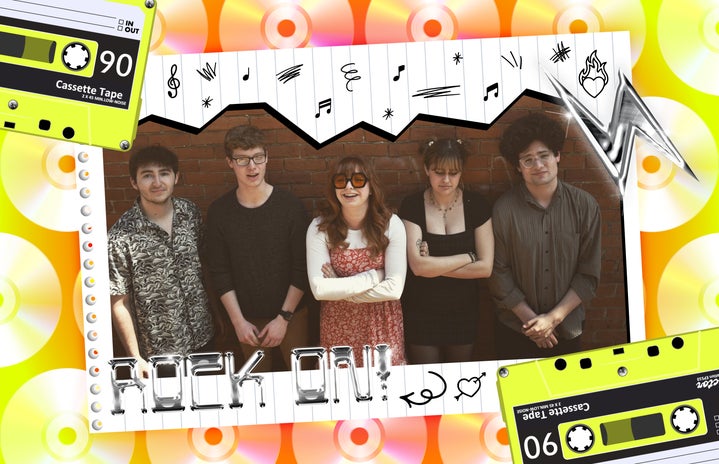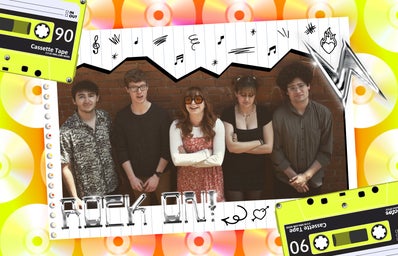All college students understand the effort and anxieties associated with both schoolwork and life in general. For students who have side hustles or passions, that stress is taken to the next level. Take the New York-based rock band Seeing Double, for example. The five members have had to navigate balancing classes, homework, and their mental wellbeing with their budding music careers.
Seeing Double has a unique sound based on the world of ‘70s pop-rock and modern indie rock. Its members — Allie Sandt on both vocals and bass, Ali McQueeney on vocals, Michael Aaron and Zach Torncello on guitar, and Dylan Travison on the drums — met in spring 2021 at SUNY Oneonta when they were all freshmen.
The band’s first singles, “Leah” and “Don’t Wait,” have amassed over 3 million streams on Spotify. Their latest single, “Take It Or Leave It,” is now available to stream both on Spotify and Apple Music. In June 2022, they played a sold out show at The Bitter End in New York City, and they’ve got more performances slated through October.
With all of these impressive accolades — on top of being actual college students — it’d be surprising if the members of Seeing Double weren’t stressed. “I think a lot of independent musicians, myself included, wrestle with juggling songwriting, producing, marketing, booking shows, and staying current online while trying to remain sane at the same time,” Sandt tells me. Add that to the regular anxieties of a college semester, and you’re basically asking for burnout.
I wouldn’t trade the opportunities we’re recieving with Seeing Double for anything, but I’ve learned thorugh trial and error that it’s important to take breaks and find the rest I need.
Ali McQueeney
To combat that, Sandt says she listens to her body. “I wouldn’t trade the opportunities we’ve received with Seeing Double for anything,” she says, “but I’ve learned through trial and error that it’s important to take breaks and find the rest I need.”
Her co-vocalist, McQueeney, agrees on the need for some downtime. “Balancing school and music is difficult because there’s always a music event going on around campus or around the town. But studies are definitely important, and [I’m now] understanding that having a night in and catching up on some work is always fun, too,” she says.
And while schoolwork takes a lot of the band members’ attention, they make it a point to come together and collaborate. “The five of us prioritize finding time after class to get together and work on new songs, and [we’re] grateful to have a school with practice rooms and recording studios that we can use for our own projects,” Sandt says. “I think we are handling it well this fall having already figured out how to manage five people’s schedules in past semesters.”
It hasn’t always been as easy as Sandt makes it out to be now, though. The members of Seeing Double have had to be really honest with each other about their mental health and wellbeing — not just for themselves, but also for the rest of the band.
“About a year ago, there was one instance where our gigging schedule just became so relentless, three or four shows in one weekend, two or three weekends in a row, that I felt myself starting to crack mentally,” Aaron says. “Between a full schedule of courses, midterms approaching rather quickly, and not having any time to myself, I had never been this overwhelmed. I approached the band and told them how I was feeling, and everyone actually felt similarly.”
Being able to express the things that you feel, but just can’t explain in words, is a very relieving feeling.
Zach Torncello
When you’re a part of a team, or in this case — a band, it’s crucial to communicate your feelings with one another. The members of Seeing Double make it a point to prioritize themselves, and their mental health, before their music. That way, they can not only be better as individuals, but better as a band.
“I have struggled with mental health for a long time and have just recently come to a point where I realized I needed more help than I could provide by myself,” McQueeney says. “It is important to remember that it is OK to ask for help and guidance.”
For the Seeing Double band members, the music they create has helped lighten some of the mental load. Torncello says, “Being able to express the things that you feel, but just can’t explain in words is a very relieving feeling.”
At the end of the day, “mental health is a rollercoaster,” McQueeney says. “There will be ups and downs and each day is different, but you should strive to make the best of each day.”
If you or someone you know is struggling with their mental health, visit the National Institute for Mental Health website or text the Crisis Text Line at 741741.
Check out the rest of the Her Campus Music Issue here.


